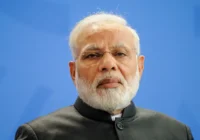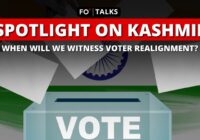In the second of a five-part series on opinion polls about the forthcoming Indian elections, pollsters agree that the BJP-led coalition will lose seats but disagree about the scale of the losses.
As election fever heats up, pollsters in India are debating outcomes. Nobel Laureate Amartya Sen once wrote about “the argumentative Indian,” and I have entered an argument with Yogendra Yadav and Sanjay Kumar of the Centre for the Study of Developing Societies (CSDS).
I must thank Shekhar Gupta of The Print who invited us to have a debate in “the spirit of healthy disagreement.” Since then, Gupta seems to have changed his mind. Therefore, I am publishing my argument on Fair Observer.
THE WEST IS THE CRADLE OF THE BJP
The ruling Bharatiya Janata Party (BJP) has close ties with the Rashtriya Swayamsevak Sangh (RSS). The RSS translates in English as the National Volunteers’ Organization and is controversial to say the least. Many, including the BBC, describe it as a right-wing, Hindu nationalist organization that is “the ideological fountainhead of the BJP.” Tellingly, Prime Minister Narendra Modi was a full-time RSS worker before he became a politician.
Most people forget that the RSS was born in Nagpur. In 1950, Jean A. Curran Jr. published a remarkable paper on the organization that is now prescribed reading in most universities. As he observed, the founder of the RSS was a Marathi Deshashtha Brahmin from Nagpur. The American scholar failed to point out that Marathi Brahmins nearly replaced the Mughal Empire in the 18th century before the British took over. Even today, Nagpur, a historic town in the western Indian state of Maharashtra, continues to be the headquarters of the RSS.
Therefore, it is little surprise that Maharashtra and Gujarat have been strongholds of the BJP. Modi, the first backward caste prime minister of India, was the chief minister of Gujarat for 13 years before he captured power in New Delhi. For a party that won merely two seats in 1984, the landslide victory in 2014 represented a remarkable rise. Needless to say, western India voted almost en bloc for the BJP.
THE YADAV CRYSTAL BALL FOR THE WEST
The eminent pollster Yadav estimates that western India is likely to witness a business-as-usual election with a small dent in the BJP tally. In 2014, it won all but six seats in this region. Things have certainly changed since.
Gujarat has experienced rural unrest with a prominent agrarian community agitating to gain advantage of India’s controversial reservation policy. As per this policy, a certain percentage of government jobs are reserved for communities designated as backward or oppressed. As if trouble in Gujarat was not enough, farmers in Maharashtra marched 180 kilometers to Mumbai to protest against the Bharatiya Janata Party. Shiv Sena, the party’s coalition partner in the state, has turned into a bitter rival and is fighting the BJP for supremacy. In Goa, the BJP is battling “disgruntled partymen and impatient allies” as the state chief minister’s health fails.
As per Yadav, the BJP will contain its losses. He opines that Gujarat may be restive, but it will end up voting for a Gujarati prime minister. Shiv Sena might make up with the BJP and their coalition is likely to win in Maharashtra. As per Yadav, the BJP could limit its losses to 15-20 in this region.
ALLIES, NOT BJP LOSING IN THE WEST
The CVoter Tracker is revealing numbers different to what Yadav predicts. Although it is too early to make firm predictions with parties still jostling and alliances yet unformed, it is clear that the vote share of the BJP-led National Democratic Alliance (NDA) has fallen from 54% to 43.8% in October. In the first-past-the-post (FPTP) system, this would lead to the BJP winning 50 instead of 53 seats. That does not seem to be a significant figure, but there is a sting in the tail.
So far, Shiv Sena has been a part of NDA. CVoter Tracker has assumed it might part ways with the BJP. In that scenario, it would suffer a catastrophic loss of as many as 14 seats. There is a real risk that this regional party might be decimated and even their bastion in Mumbai might fall. Yadav’s estimate about seat loss for the BJP applies more to the Shiv Sena. As of now, the NDA would lose seats, but the BJP, the biggest party in this coalition, is escaping with a minimal loss.
 In the long run, Shiv Sena’s potential meltdown might be good news for the BJP. The two parties have been described as frenemies. They are both battling for the same core support base. Shiv Sena is based on both Hindu identity and Marathi pride. This focus on regional identity is a problem for the BJP, which is trying desperately hard to be a national party. The BJP has been trying to sublimate Marathi pride into Hindu pride and has outsmarted Shiv Sena so far.
In the long run, Shiv Sena’s potential meltdown might be good news for the BJP. The two parties have been described as frenemies. They are both battling for the same core support base. Shiv Sena is based on both Hindu identity and Marathi pride. This focus on regional identity is a problem for the BJP, which is trying desperately hard to be a national party. The BJP has been trying to sublimate Marathi pride into Hindu pride and has outsmarted Shiv Sena so far.
Led by Devendra Fadnavis, the shrewd chief minister of Maharashtra, the BJP has been stealing Shiv Sena’s clothes as well the opposition’s. Most recently, he has been appealing to the Maratha community, traditionally supporters of the Indian National Congress and local strongman Sharad Pawar. Shiv Sena is a fiefdom of the Thackeray clan that has been weakened by a family feud. Its dynastic leadership has become disconnected with its supporters and Fadnavis is taking advantage of it.
Goa sends only two members of parliament to New Delhi. Even here, the BJP might be in a better position than what Yadav estimates. The key state is Gujarat, though. This is Modi’s home turf where he earned his chops as a potential national leader. In 2017, the opposition mounted a rather strong challenge to the BJP here. Yet this strong showing disguised the fact that the BJP won 49% of the votes in comparison to 41% for the Congress party. It resulted in the former winning 99 seats, primarily in urban conglomerations, while the Congress won 77 seats, largely in rural areas.
In 2014, all 26 of Gujarat’s members of parliament belonged to the BJP. CVoter Tracker estimates that 55% of Gujaratis are likely to vote for the BJP in the national elections, with 38% opting for the Congress. It appears that the pull of the son of the soil cannot be underestimated. Gujaratis draw great pride from the fact that Modi is the first full five-year term prime minister from this coastal state. This makes it quite possible that 26-0 might be the BJP-Congress score in Gujarat once again, giving the ruling party a big boost in its home turf of western India.
The views expressed in this article are the author’s own and do not necessarily reflect Fair Observer’s editorial policy.
Support Fair Observer
We rely on your support for our independence, diversity and quality.
For more than 10 years, Fair Observer has been free, fair and independent. No billionaire owns us, no advertisers control us. We are a reader-supported nonprofit. Unlike many other publications, we keep our content free for readers regardless of where they live or whether they can afford to pay. We have no paywalls and no ads.
In the post-truth era of fake news, echo chambers and filter bubbles, we publish a plurality of perspectives from around the world. Anyone can publish with us, but everyone goes through a rigorous editorial process. So, you get fact-checked, well-reasoned content instead of noise.
We publish 2,500+ voices from 90+ countries. We also conduct education and training programs
on subjects ranging from digital media and journalism to writing and critical thinking. This
doesn’t come cheap. Servers, editors, trainers and web developers cost
money.
Please consider supporting us on a regular basis as a recurring donor or a
sustaining member.
Will you support FO’s journalism?
We rely on your support for our independence, diversity and quality.






